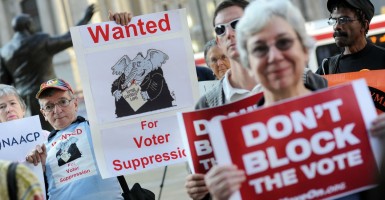A federal court has struck down Texas’ voter identification law due to what the judges call its “discriminatory effect.”
The U.S. Court of Appeals for the 5th Circuit in New Orleans ruled that the Texas law is in violation of the Voting Rights Act of 1965.
“We affirm the district court’s finding that SB 14 has a discriminatory effect in violation of Section 2 of the Voting Rights Act,” the judges wrote in their opinion.
The law requires voters to present photo identification such as a driver’s license or U.S. passport before casting a ballot.
Supporters say that voter identification laws protect the integrity of the democratic process by reducing voter fraud.
“In light of ongoing voter fraud, it is imperative that Texas has a voter ID law that prevents cheating at the ballot box,” Gov. Greg Abbott, R-Texas, said in a statement. “Texas will continue to fight for its voter ID requirement to ensure the integrity of elections in the Lone Star State.”
Opponents say voter identification laws discriminate against low-income and minority voters who may not have easy access to the required documents.
“This is a tremendous victory for Texas voters,” Myrna Pérez, the deputy director of the Democracy Program at the Brennan Center, said in a statement. “More than half a million registered voters do not have the kind of ID required by Texas’s harsh new law. Texas should heed the admonishment of three courts, abandon their discriminatory law, and start working to make sure Texas voters can make their voices heard.”
The plaintiffs in the case included individual voters, civil rights groups and the Department of Justice.
In a 2014 ruling, a federal district court in Texas sided with the plaintiffs about the “discriminatory effect” the law had on minority voters. But that court also said legislators had intentionally adopted a discriminatory law.
The appeals court did not affirm that Texas purposely intended to discriminate.
Hans von Spakovsky, a senior legal fellow at The Heritage Foundation, told The Daily Signal that he hopes the ruling will be appealed.
“The finding of the three-judge panel of the Fifth Circuit that the Texas voter ID law violated Section 2 of the Voting Rights Act because it supposedly could have a discriminatory effect on minority voters ignores the state’s actual experience with voter ID in state and federal elections in 2013 and 2014,” von Spakovsky said. “Turnout data shows the voter ID law did not suppress turnout – there is no evidence that anyone was prevented from voting. This decision is completely wrong on both the facts and the law – hopefully Texas will appeal and challenge the ruling.”
The 5th Circuit is sending portions of the law back to the Texas district court for reconsideration.
“The district court must carefully scrutinize whether the tactics employed by the Texas Legislature are indeed evidence of purposeful discrimination,” the judges wrote.






















